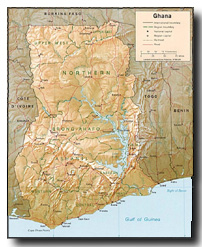What African Women Want (not Reproductive Health Care)
- STEVE MOSHER
PRI recently completed its first-ever survey of the health care needs of the African people. Carried out in the West African country of Ghana, the survey results indicate zero demand for "reproductive health care." There are huge, unmet needs for many kinds of primary health care in Africa, but the claim of the population control lobby that there is an "huge unmet need" for contraception, sterilization, and abortion is demonstrably false.
 |
Who wants reproductive health care? Not the people of Ghana, according to a just completed survey of health care needs in that country.
The survey, the first of a series of similar surveys to be carried out in different regions of Africa, was conducted in the Ghanaian city of Takoradi. A total of 397 individuals of both sexes were interviewed by one of four trained interviewers on one of Takoradi's main thoroughfares, selected at random from the constant stream of passersby.
Those interviewed were shown a list of 15 different health programs, and asked to rank order the list from greatest to least in terms of their own personal health needs. The fifteen kinds of health programs listed were Malaria Eradication, Leprosy Treatment, Reproductive Health, Syphilis Treatment, Polio Prevention, Clean Water Program, Natural Family Planning, Sleeping Sickness, Gonorrhea Treatment, Tuberculosis Treatment, Yellow Fever Prevention, HIV/AIDS prevention, Cholera Treatment, Measles Prevention, and unnamed "Other Programs."
Other information collected included sex, age, religion, marital status, and prior history of contraception, sterilization and abortion. The data on health needs was entered into a database and the mean rank order was calculated for each category. The higher the rank order for a particular kind of health care, the greater the perceived need.
The most pressing health care needs identified by the respondents were for Malaria Treatment (mean rank order 4.16), Natural Family Planning education (5.23), Clean Water Program (5.30), Measles Prevention (5.54), and HIV/Aids Prevention (5.86). Malaria, Measles, and HIV/AIDS are all diseases which, in the Ghanaian context, run at epidemic or near-epidemic proportions and so are of obvious concern. The citizens of Ghana are also clearly aware that polluted drinking water is a vector for the transmission of disease, and so give a high rank to clean water programs.
The only surprise in this cluster of health needs is the high ranking of NFP, which was welcome by the respondents as a natural means of planning one's family. In the comments section of the questionnaire, a number of respondents declared that they would like more education on NFP.
Second order health needs (with mean rank orders from 7.14 down to 9.97) included Tuberculosis Treatment, Cholera Treatment, Leprosy Treatment, Polio Prevention, Sleeping Sickness, and Syphilis and Gonorrhea treatment. These are all diseases which are endemic in Ghana, although not affecting the percentage of the population that, say, HIV/AIDS does.
The single most striking result of the survey is the dismal showing of Reproductive Health. This category of health care, defined as the limitation of child bearing by means of contraception, sterilization, and abortion, came in dead last. It had a mean rank order of 13.66. Even "Other Programs" ranked higher.
Reproductive health care was also overwhelmingly rejected by the Ghanaian interviewees in the comments section of the interview. Mention of reproductive health elicited strong negative comments from the interviewees such as "Stop reproductive health; it's not good," "Stop reproductive health, eradicate malaria, and "We don't need reproductive health programs."
Population control organizations active in Africa, including UNFPA, the US Agency for International Development, speak of "huge unmet needs" for their reproductive health programs. They justify their promotion of contraception, sterilization, and abortion by claiming that this is what the African people want.
Our survey suggests that this is not only untrue, but that it is a complete perversion of the truth. Ghana has huge, unmet needs for many kinds of primary health care, but reproductive health care is not one of them. The Ghanaian people not only do not welcome programs of contraception, sterilization, and abortion, they view such programs as a positive evil.
Let's start giving the people of Africa health care programs that they really need, instead of inflicting upon them anti-life programs that they do not want.
 This is Meaghen Gonzalez, Editor of CERC. I hope you appreciated this piece. We curate these articles especially for believers like you.
This is Meaghen Gonzalez, Editor of CERC. I hope you appreciated this piece. We curate these articles especially for believers like you.
Please show your appreciation by making a $3 donation. CERC is entirely reader supported.

Acknowledgement
Steven W. Mosher. "What African Women Want (not "Reproductive Health Care"). PRI Weekly Briefing 22 August 2001 Vol. 3/ No. 21.
Reprinted with permission of the Population Research Institute.
The Author
Steven W. Mosher, President of the non-profit Population Research Institute, is widely recognized as one of the world's leading authorities on the population question. Steven Mosher, a convert to Catholicism, is the author of the best-selling A Mother's Ordeal: One Woman's Fight Against China's One-Child Policy. Other books authored by Steve include Hegemon: China's Plan to Dominate Asia and the World, China Attacks, China Misperceived: American Illusions and Chinese Reality, Journey to the Forbidden China, and Broken Earth: The Rural Chinese. Articles by Steven Mosher have appeared in The Wall Street Journal, Reader's Digest, TheNew Republic, National Review, Reason, The Asian Wall Street Journal, Freedom Review, and numerous other publications. Steve Mosher and his wife, Vera, have nine children. They reside in Virginia.
Copyright © 2001 Population Research Institute



